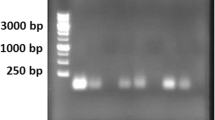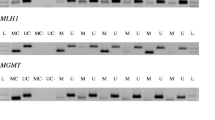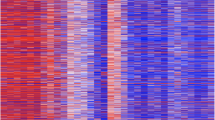Abstract
Hypermethylation is epigenetic alteration, well known for gene silencing. CHD1 gene is known as invasion and tumor suppressor gene, decreased expression due to hypermethylation could promote tumor cell invasion and metastasis. Present study designed to investigate the CDH1 gene promoter hypermethylation status by methylation specific polymerase chain reaction in 100 newly diagnosed gastric cancer patients. 53% of hypermethylation was observed in DNA extracted from blood in Gastric cancer patients while 66% was observed in serum based DNA. Significant differences in CDH1gene promoter hypermethylation was observed in serum based DNA extracted from Gastric cancer patients. Patients in early stage (I & II) vs advanced stage (III & IV), distant organ metastases vs no metastases had 60% vs 7% and 42% 24% of CDH1 promoter hypermethylation in serum DNA (p = 0.006, 0.001) respectively. Patients who were with lymph node invasion, loss of appetite, loss of weight had 55%, 47%, 61% CDH1 gene promoter hypermethylation compare to who were not with lymph node invasion, loss of appetite, loss of weight had 11%, 19%, 5% of hypermethylation and these differences was found to be significant. Strong association was observed with overall median survival of patients (p < 0.0001). Patients who had CDH1 gene promoter hypermethylation in serum based DNA showed poor overall median survival (14.3 months) and unmethylated patients had better overall median survival (33.2 months). CDH1 hypermethylation status was found to be associated with advancement of disease, distant organ metastases and lymph node invasion in Gastric cancer patients.


Similar content being viewed by others
References
Siegel R, Ma J, Zou Z, Jemal A (2014) Cancer statistics, 2014. CA Cancer J Clin 64:9–29
Lee JH, Han SU, Cho H, Jennings B, Gerrard B, Dean M, Schmidt L, Zbar B, Vande Woude GF (2000) A novel germ line juxtamembrane Met mutation in human gastric cancer. Oncogene 19(43):4947–4953
Yousuf A, Bhat MY, Pandith AA, Afroze D, Khan NP, Alam K, Shah P, Shah MA, Mudassar S (2014) MGMT gene silencing by promoter hypermethylation in gastric cancer in a high incidence area. Cell Oncol 37:245–252
Goffin J, Eisenhauer E (2002) DNA methyltransferase inhibitors—state of the art. Ann Oncol 13:1699–1716
Baylin SB, Belinsky SA, Herman JG (2000) Aberrant methylation of gene promoters in cancer. Concepts, misconcepts and promise. J Natl Cancer Inst 92:1460–1461
Van RF (2014) Beyond E-cadherin: roles of other cadherin superfamily members in cancer. Nat Rev Cancer 14:121–134
Karayiannakis AJ, Syrigos KN, Chatzigianni E, Papanikolaou S, Alexiou D, Kalahanis N et al (1998) Aberrant E-cadherin expression associated with loss of differentiation and advanced stage in human pancreatic cancer. Anticancer Res 18:4177–4180
Humar B, Blair V, Charlton A, More H, Martin I, Guilford P (2009) E-cadherin deficiency initiates gastric signet-ring cell carcinoma in mice and man. Cancer Res 69:2050–2056
Galanter JM, Christopher RG, Sam SO, Torgerson D, Pino-Yanes M, Thakur N et al (2015) Methylation analysis reveals fundamental differences between ethnicity and genetic ancestry. Bio Rxiv. https://doi.org/10.1101/036822
Kang GH, Lee HJ, Hwang KS, Lee S, Kim JH, Kim JS (2003) Aberrant CpG Island hypermethylation of chronic gastritis, in relation to aging, gender, intestinal metaplasia, and chronic inflammation. Am J Pathol 163:1551–1556
Choi IS, Wu TT (2005) Epigenetic alterations in gastric Carcinogenesis. Cell Res 15:247–254
Nawroz H, Koch W, Anker P, Stroun M, Sidransky D (1996) Microsatellite alterations in serum DNA of head and neck cancer patients. Nat Med 2(9):1035–1037
Hibi K, Robinson CR, Booker S, Wu L, Hamilton SR, Sidransky D, Jen J (1998) Molecular detection of genetic alterations in the serum of colorectal cancer patients. Cancer Res 58:1405–1407
Kopreski MS, Benko FA, Borys DJ, Khan A, Kwee CM, McGarrity TJ et al (1998) Mutated KRAS DNA in plasma as a marker in early colorectal neoplasia. Proc Am Soc Clin Oncol 17:269
Lee TL, Leung WK, Chan MW, Ng EK, Tong JH, Lo KW, Chung SC, Sung JJ, To KF (2002) Detection of gene promoter hypermethylation in the tumor and serum of patients with gastric carcinoma. Clin Cancer Res 8:1761–1766
Rashid H, Alam K, Afroze D, Yousuf A, Banday M, Kawoosa F (2016) Hypermethylation status of E-Cadherin gene in gastric cancer patients in a high incidence area. APJCP 17(6):2757
Tamura G, Yin J, Wang S, Fleisher AS, Abraham JM, Kong D (2000) E-Cadherin gene promoter hypermethylation in primary human gastric carcinomas. J Natl Cancer Inst 92:569–573
Benton G, Crooke E, George J (2009) Laminin-1 induces E-cadherin expression in 3-dimensional cultured breast cancer cells by inhibiting DNA methyltransferase 1 and reversing promoter methylation status. FASEB J 23:3884–3895
Cheng CW, Wu PE, Yu JC, Huang CS, Yue CT, Wu CW, Shen CY (2001) Mechanisms of inactivation of E-cadherin in breast carcinoma: modification of the two-hit hypothesis of tumor suppressor gene. Oncogene 20:3814–3823
Liu J, Sun X, qin S, Wang H, Ning D, Li Y et al (2016) CDH1 promoter methylation correlates with decreased gene expression and poor prognosis in patients with breast cancer. Oncol Lett 11:2635–2643
Caldeira JR, Prando EC, Quevedo FC, Neto FA, Rainho CA, Rogatto SR (2006) CDH1 promoter hypermethylation and E-cadherin protein expression in infiltrating breast cancer. BMC Cancer 6:48
Lee S, Lee HJ, Kim JH, Lee HS, Jang JJ, Kang GH (2003) Aberrant CpG island hypermethylation along multistep hepatocarcinogenesis. Am J Pathol 163(4):1371–1378
Acknowledgements
Author thanks to all the study subjects that participated in this study.
Author information
Authors and Affiliations
Corresponding author
Ethics declarations
Conflict of Interest
None.
ZL: Conducting experiment, Data collection and writing.
ZG: Concept, study design, analysis of data, drafting of manuscript and approval for final draft.
Additional information
Publisher’s Note
Springer Nature remains neutral with regard to jurisdictional claims in published maps and institutional affiliations.
Rights and permissions
About this article
Cite this article
Li, Z., Guo, Z. Comparison of CDH1 Gene Hypermethylation Status in Blood and Serum among Gastric Cancer Patients. Pathol. Oncol. Res. 26, 1057–1062 (2020). https://doi.org/10.1007/s12253-019-00658-5
Received:
Accepted:
Published:
Issue Date:
DOI: https://doi.org/10.1007/s12253-019-00658-5




